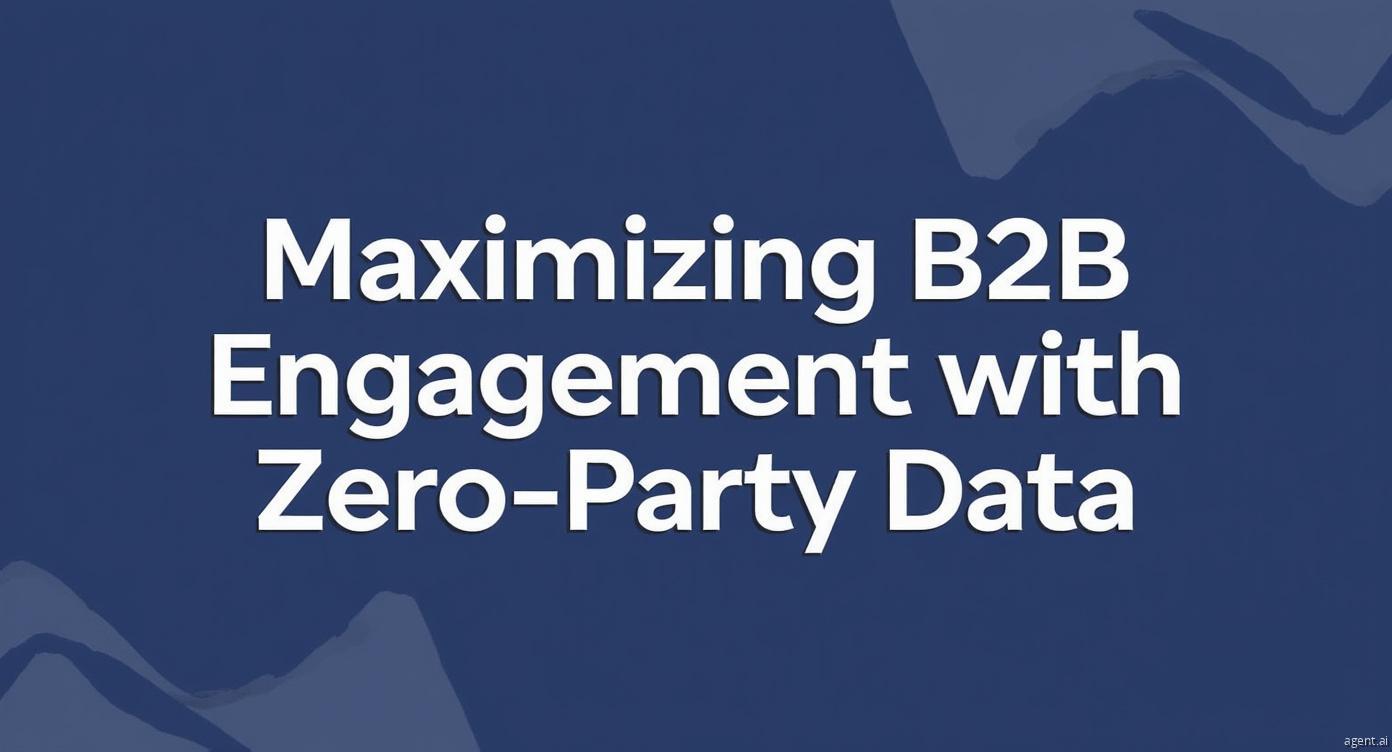Maximizing B2B Engagement with Zero-Party Data

In the modern B2B marketing landscape, personalization, trust, and compliance are paramount. Zero-Party Data data willingly shared by buyers enables marketers to understand preferences, deliver relevant campaigns, and maintain transparency. Organizations leveraging zero-party data can strengthen buyer relationships, improve engagement, and enhance campaign effectiveness in 2025 and beyond.
What is Zero-Party Data?
Zero-party data is information that buyers voluntarily provide to brands, such as content preferences, purchase intentions, feedback, and interests. Unlike first-party data collected via behavioral tracking or third-party data obtained through external sources, zero-party data is explicitly shared with consent.
This direct approach ensures accuracy, reliability, and ethical compliance, making zero-party data a highly valuable asset for B2B marketing campaigns.
Key Benefits of Zero-Party Data
Zero-party data offers significant advantages for marketers:
-
Accurate Insights – Information provided voluntarily reduces inaccuracies and assumptions.
-
Enhanced Personalization – Enables hyper-targeted campaigns tailored to buyer interests.
-
Trust Building – Buyers feel secure knowing they control what they share.
-
Regulatory Compliance – Aligns with GDPR, CCPA, and DPDP regulations.
-
Higher Engagement – Relevant campaigns result in stronger responses and conversions.
Building Trust with Buyers
Trust is critical in B2B relationships. Zero-party data allows buyers to dictate the information they provide, creating transparency and confidence.
By clearly communicating the purpose of data collection and offering value—such as personalized resources, insights, or offers—marketers can encourage buyers to share information willingly and accurately.
Collecting Zero-Party Data Effectively
Effective zero-party data collection requires intentional strategies:
-
Preference Centers – Allow buyers to choose topics, channels, and frequency for communication.
-
Interactive Experiences – Quizzes, polls, and assessments engage users while collecting insights.
-
Surveys and Feedback Forms – Capture preferences, business priorities, and interests directly from prospects.
-
Event Registrations – Collect information during webinars, workshops, or conferences for tailored follow-ups.
Offering clear benefits and maintaining transparency encourages high-quality data sharing.
Personalization Using Zero-Party Data
Zero-party data empowers marketers to deliver personalized campaigns across email, social media, landing pages, and ABM initiatives.
For example, if a prospect expresses interest in a specific product, marketers can provide relevant case studies, product demos, or tailored content. Personalized campaigns improve engagement, increase conversion potential, and accelerate the buyer journey.
Compliance and Ethical Marketing
Zero-party data inherently supports privacy compliance, as it is shared voluntarily. Marketers should maintain clear privacy policies, obtain explicit consent, and provide options for buyers to manage or revoke their data preferences.
Ethical use of zero-party data not only ensures compliance but also enhances credibility and trust, reinforcing long-term relationships with clients and prospects.
Integrating Zero-Party Data Across Platforms
To maximize effectiveness, zero-party data should be integrated with CRMs, marketing automation tools, and analytics systems. Integration allows marketers to combine voluntarily shared insights with behavioral data for better segmentation and targeting.
A unified data approach ensures consistent messaging across channels, enhancing personalization, engagement, and overall campaign performance.
Strengthening Account-Based Marketing (ABM)
Zero-party data is particularly beneficial for ABM. Insights directly shared by high-value accounts allow marketers to design targeted campaigns, address specific challenges, and engage decision-makers effectively.
Combining zero-party data with behavioral and firmographic insights enables precise targeting, shorter sales cycles, and higher conversion rates for ABM initiatives.
Measuring Success and ROI
Using zero-party data, marketers can measure engagement, conversions, and ROI more accurately. Explicitly shared data is highly predictive of buyer intent, providing actionable insights for optimization and resource allocation.
Organizations can continuously refine campaigns, improve targeting, and enhance performance based on reliable consent-driven data.
Preparing for a Privacy-First Future
As privacy regulations tighten and B2B buyers demand transparency, zero-party data will become an essential component of marketing strategies. Organizations embracing zero-party data can deliver personalized, compliant, and trust-driven campaigns that foster engagement, strengthen relationships, and support sustainable growth.
Read the Full Blog: https://acceligize.com/featured-blogs/zero-party-data-in-b2b-marketing-building-trust-compliance/
About Us
Acceligize is a premier global partner for B2B demand generation and marketing, focused on driving scalable, data-driven growth. Leveraging cutting-edge tools such as Conversational AI and intelligent chatbots, we enable brands to engage the right prospects, foster meaningful interactions, and accelerate lead conversions. Our approach blends personalization, automation, and actionable insights, ensuring every marketing initiative delivers measurable results. Supported by a team of skilled marketers and a powerful technology infrastructure, Acceligize turns marketing outreach into tangible business impact, redefining growth possibilities in today’s competitive B2B environment.
- Art
- Causes
- Crafts
- Dance
- Drinks
- Film
- Fitness
- Food
- Games
- Gardening
- Health
- Home
- Literature
- Music
- Networking
- Other
- Party
- Religion
- Shopping
- Sports
- Theater
- Wellness




